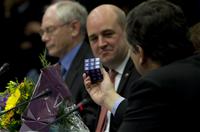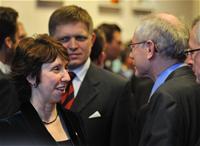Total chaos
Adelina Marini, March 1, 2010
 If I was president Obama I would also not attend the regular US-EU summit in Europe in April. It would be as if a high and very precious guest is coming to your place for a planned dinner and instead of a kind reception, good discussion, nice atmosphere and delicious food, the guest appears to be in the centre of a family row which threatens to go out of control.
If I was president Obama I would also not attend the regular US-EU summit in Europe in April. It would be as if a high and very precious guest is coming to your place for a planned dinner and instead of a kind reception, good discussion, nice atmosphere and delicious food, the guest appears to be in the centre of a family row which threatens to go out of control.
Currently the EU is in a total chaos, especially in terms of its institutions because the numerous small and not that small compromises, which form the Lisbon Treaty, started to blow off just like land mines. Now it is evident that the Treaty does not state explicitly who the boss is, no matter that the document's pretenses were exactly this problem to be clarified. Thus, the administration of the American president is not aware who should the president meet with - it is the president of the European Council Herman van Rompuy or the president of the Commission - Jose Manuel Barroso, or the Spanish prime minister Jose Luis Rodriguez Zapatero, whose country is now holding the rotation presidency by the end of June?
Not less disputes causes the position of the High Representative for External Relations, entrusted to the British baroness Catherine Ashton. Recently she was severely criticised for not attending a regular defence ministers meeting with senior NATO leadership. Instead, she indulged attending the inauguration ceremony of the new Ukrainian president Victor Yanukovich. Some EU member states murmured that the previous EU High Representative for Foreign Policy and Security Javier Solana never missed these meetings and that the ceremony in Kiev could have been attended by Barroso or Zapatero.
These statements clearly show that the Lisbon Treaty definitely does not bring the clarity which it was created for in the first place.
Furthermore, the European Parliament voted last week a resolution announcing that more employees must be appointed in the institution, so that it could respond to the new functions the Lisbon Treaty gave it. This caused serious rows about the need of adjustment of the budget of the Parliament which is already approved and cannot be changed. The only thing that can be changed is whether the money for some activities could be reduced for the sake of others.
And today the British daily the Guardian published an article in which, quoting a secret German document, reports that Germany and France are alarmed at the prominence of British officials in the new EU diplomatic service being formed under Ashton. According to the document, Britain "has grabbed an "excessive" and "over-proportionate" role".
Berlin and Paris are anxious that they are losing the battle to win key positions in the new service which is to be the main vehicle for projecting European power globally under the Lisbon Treaty.
The funny thing about this story is that it was Germany and France that insisted the most, the chief  of the diplomatic service to be nondescript and not very popular person exactly to prevent him or her from "grabbing power". Yet during the election of baroness Ashton and of the European president Herman van Rompuy there was heavy bargaining, again in terms of the biggest European powers (France, Germany and Britain) not to lose influence. Instead, they caused each other chess-mate.
of the diplomatic service to be nondescript and not very popular person exactly to prevent him or her from "grabbing power". Yet during the election of baroness Ashton and of the European president Herman van Rompuy there was heavy bargaining, again in terms of the biggest European powers (France, Germany and Britain) not to lose influence. Instead, they caused each other chess-mate.
Let us not forget that against the background of all this, the scandal with Greece's frauds is still brewing and boiling, which led to a serious turmoil in one of the biggest prides of Europe - the monetary union.
Now, imagine how the US president Barack Obama is arriving in Madrid (or Brussels, if by accident Van Rompuy won the battle). There are not many issues he can discuss right now with any of his European partners, because nothing is ready institutionally yet. The EU still cannot send special envoys at the hot spots around the planet nor can take an unanimous decision to sent more troops in Afghanistan, for example, because such a decision was left to the member states themselves. He cannot discuss the economic situation and financial regulation either, because the Union itself and the eurozone, especially, still have no answer how to proceed with Greece.
The US was also involved in the Greek drama after the revelations that American investment banks traded with Greek state debt, thus helping Athens to cover up its dire financial problems and join the euro area with all criteria fulfilled. A strong signal for the lack of a need for another Transatlantic summit was sent in the Autumn during the previous regular summit too.
This is why, maybe, although it did not want to, the EU should use 2010 for reflection - first because it needs time to build its new institutions up, as envisaged in the Reform Treaty and, second, to think how exactly to use them.
Of course, there is a third choice, but it is too pessimistic and we will not share it now ... for now.